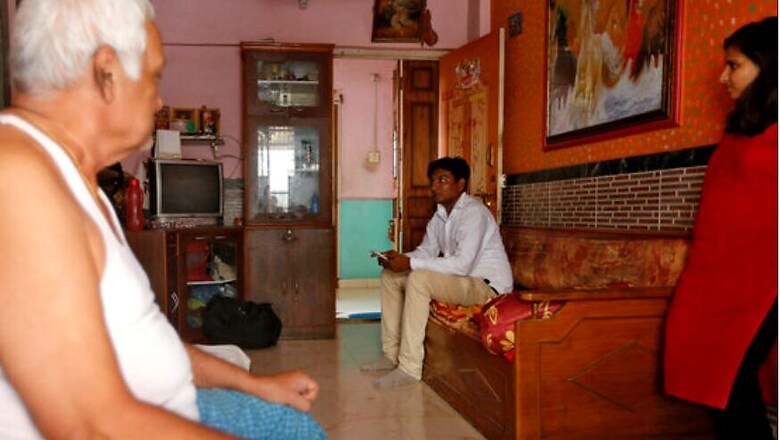
views
Mumbai: Sachin Bhadrasen Jaiswar goes from door to door in a middle class neighbourhood outside Mumbai measuring India's economic pulse, one of hundreds of survey takers working for private firms aiming to fill a gap - the lack of reliable data.
There has long been deep skepticism about the accuracy of economic indicators in India, a country of 1.2 billion people of whom 90 percent are estimated to be part of the grey economy.
Independent economists question the government's assessment of everything from industrial output to unemployment, but the main data "black hole" is consumer indicators including retail sales, and that is where people like 29-year-old Jaiswar come in.
On a recent visit to an apartment, he spent an hour asking questions ranging from how much the family there spent on vegetables to whether they expected their financial situation to improve, tapping the answers into a special app on his iPhone.
"We are building the most advanced survey execution machinery in the world," said Mahesh Vyas, chief executive officer at Centre for Monitoring Indian Economy (CMIE), for whom Jaiswar works.
"The government machinery will take a long time to reach the levels we have reached already."
CMIE employs 350 survey takers on long-term contracts, and they cover 158,000 households across the country, with each one interviewed three times a year.
Rival Kantar, a market research firm tracking consumer behaviour, says it surveys more than 80,000 Indian households a month for their retail demand survey, and taps a database of 5,000 survey takers to conduct interviews when required for clients including big corporations and even the government.
Such companies rely heavily on visits, with large segments of the Indian population neither online nor accessible by phone, especially in rural areas.
The accuracy of their findings is also questioned by experts, but the business can be lucrative in a country where foreign and domestic investors, attracted by rapid economic expansion, are hungry for information and trends.
POOLING DATA
Madan Sabnavis, chief economist of CARE Ratings, said he frequently incorporated data provided by private companies into his forecasts, including unemployment, retail indicators and corporate investments.
"They may not always be reliable as the numbers are based on surveys, but in the absence of any other information we do look at it. I need to get some idea of what's happening, and at least they give you that," he said.
CMIE has tied up with India's BSE Ltd, formerly known as Bombay Stock Exchange, to provide an alternative to official jobless figures.
According to CMIE and BSE, India's unemployment rate was 8.85 percent in September, and higher in urban areas than in rural ones.
By contrast, India's Labour Bureau, in its annual unemployment report out last month, put the rate at 5 percent as of December 2015 and drew the opposite conclusion: that it was running higher in rural areas than urban ones.
Pronab Sen, the former Chief Statistician of India and now a country director for think-tank International Growth Centre, said a key difference between state and private surveys was that the government lacked staff to do them often enough.
But Sen also noted that the private providers' use of contract survey takers raises questions about quality, and said the government used rigorously trained officials, even if less frequently.
"As far as surveys are concerned that's a lot trickier. There, one needs to be careful about the sample size but also upon the nature of the persons collecting the data," he said.
CMIE said its survey takers were no less qualified than those working for the government, and underwent thorough training.
A senior official at the Labour Bureau said it used "international accepted methodology and concepts" to compile its unemployment report, and added more than 1,000 people were involved in collecting the data, including supervision and processing, more than at CMIE.
GROWING NICHE
Selling data in India can be highly lucrative, with consumer trends in particular valued by companies and investors.
Industry body National Association of Software and Services Companies (NASSCOM) estimates that India's data analytics business will grow to $16 billion by 2025 from $2 billion today.
CMIE, for example, charges from 100,000 to 1.5 million rupees ($1,500-$22,500) a year, with an average of 200,000 rupees for subscriptions to its data bases.
Kantar would not disclose how much it charged, but said it was witnessing strong growth.
"If we look at the last few years, the market research industry has been growing in double digits – a reflection of the frequency and intensity of usage," said Preeti Reddy, CEO, Kantar Insights, South Asia, in emailed answers.
The data can also provide investment opportunities. Mumbai-based ZyFin Holdings started out gathering consumer confidence data as a research firm.
The data, its chairman Sanjay Sachdev said, was sold to major companies that "wanted to get an inkling and an understanding of what is happening to the real India."
But Sachdev said he stopped selling the data after realising he could make more money by starting an equity-traded fund that invested based on his numbers.
It has given absolute returns of 7.3 percent in dollar terms since its inception in November 2015 to September 2016.
Sachdev said using surveys allowed him to get details within trends that is not captured elsewhere, including urbanisation and modernisation in India.
"People call real India 'Bharat'," he said. "There's a difference between Bharat and 'India'."



















Comments
0 comment